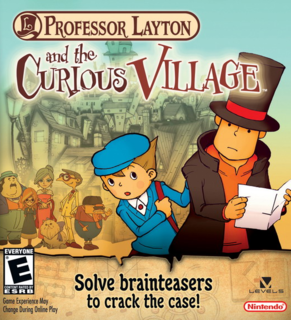Professor Layton and the Curious Village is a true gentleman's puzzle game.
+ loads of enjoyable puzzles varying in difficulty and in objectives
+ surprisingly charming story, especially considering the game's genre
+ good amount of replay value
+ stunning visuals in cutscenes and environments
Cons:
- irritating music is a nuisance
- hints can sometimes be useless
A plethora of games on the Nintendo DS are meant to give your brain a good workout. Unfortunately, many of them, while mildly fun, are shallow minigame collections that require fast hand-eye coordination rather than critical thinking skills. Professor Layton and the Curious Village changes this by requiring you to think outside the box to solve its many challenging logic puzzles that come your way. The game's brainteasers, combined with an interesting mystery story, craft one of the best puzzle games available on the DS despite a few issues of its own.
The story follows the gentlemanly, intuitive Professor Hershel Layton and his young, aspiring apprentice Luke. The two are summoned to the tiny village of St. Mystere shrouded in, well, mystery. On their adventure, they must search for the "Golden Apple," an item secretly concealed to be found after the town's baron's death. Once Layton and Luke first step foot in the village, odd events occur, such as disappearances of people that add to a list of bewildering mysteries to solve. Speaking of people, you'll meet many eccentric and bizarre villagers, who add even more strangeness to the peculiar town. The satisfying conclusions, which will probably be complete surprises to you, also fit well in the game's solid story.
To gather clues about the Golden Apple's whereabouts, you must walk the streets and alleys of St. Mystere. Everything from wandering in the village to interacting with people and objects are controlled by tapping the touch screen. You'll come across many areas including a town plaza, a mansion, an abandoned amusement park, and even the sewers. Tapping certain objects in the background award you hint coins or secret puzzles to crack. Tapping on the many townsfolk in St. Mystere, who all have an odd affinity for puzzles, will allow you to interact with them. Many will be of help to you, but only after you solve one of their mind-boggling puzzles.
Because Professor Layton is renowned for his puzzle-solving aptitude, your grey matter will be tested throughout the game by a diverse collection of riddles and logic puzzles. These brainteasers have many different objectives, such as figuring out someone's age, drawing paths or shapes, organize sitting arrangements for bickering siblings, finding out who in a group of four is lying, and tons more. The difficulties of the puzzles vary greatly and increase as you progress through the story, and you'll feel a real sense of accomplishment after completing the particularly tough ones near the end. Thankfully, there is no time limit, which would make them much more frantic and frustrating. There is no doubt that you'll be stumped on a brainteaser every so often (puzzles in which you slide blocks around are especially tedious), but hint coins that you find in the town can be spent on hints (one hint per coin, three hints per puzzle). However, there is a limited amount of hint coins in the village, and not all of them are helpful. But the puzzles are easily Professor Layton's best feature. What makes this so is the clever execution of them that either forces you to use creative thinking or misleads you to overthink surprisingly simple solutions.
You probably won't find or solve all of the 120 puzzles in the game's story mode on your first playthrough, so you'll likely go back to search for these. You can also complete other extra tasks, such as collecting gizmos for an unknown gadget and decorating Layton's and Luke's rooms at the inn. Doing all of this unlocks bonus content and even more puzzles with insanely high difficulties. It is very pleasing to have so many puzzles and content because once you start playing Professor Layton, it is likely that you won't want to put it down.
The game is no slouch in graphics either. The story is told in full-motion cinematics that are simply mind-blowing considering the quality of visuals other DS games have to offer. The detailed areas of the village and the character designs also fit really well with the overall mood of the game. Voice acting is decent as well as the clarity of most of the sound effects. The game's music, however, isn't quite as spectacular. The cheesy accordion music is so monotonous and dull that it may even give you a headache if you listen to it too loudly.
Professor Layton and the Curious Village is not at all an orthodox puzzle game. It provides many remarkable features rare to the Nintendo DS, let alone its own genre. It can be very easy for anyone to get hooked on this game. Every DS owner should look into it, especially puzzle fans looking for something a little more unique, a little more story-oriented, and a little more gentlemanly.
Score: 8.7/10

